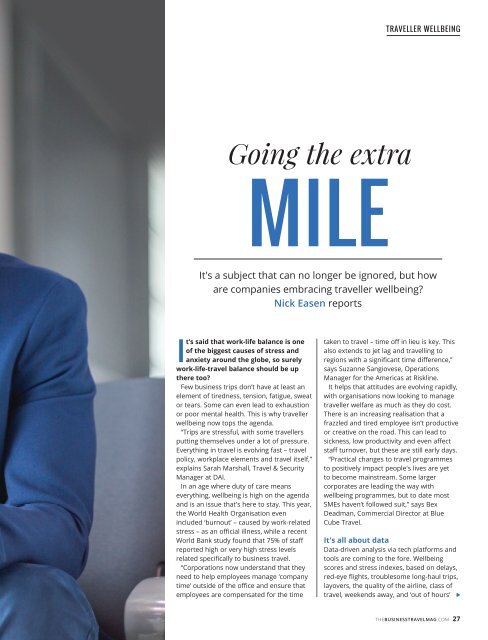Create successful ePaper yourself
Turn your PDF publications into a flip-book with our unique Google optimized e-Paper software.
TRAVELLER WELLBEING<br />
Going the extra<br />
MILE<br />
It's a subject that can no longer be ignored, but how<br />
are companies embracing traveller wellbeing?<br />
Nick Easen reports<br />
It’s said that work-life balance is one<br />
of the biggest causes of stress and<br />
anxiety around the globe, so surely<br />
work-life-travel balance should be up<br />
there too?<br />
Few business trips don’t have at least an<br />
element of tiredness, tension, fatigue, sweat<br />
or tears. Some can even lead to exhaustion<br />
or poor mental health. This is why traveller<br />
wellbeing now tops the agenda.<br />
“Trips are stressful, with some travellers<br />
putting themselves under a lot of pressure.<br />
Everything in travel is evolving fast – travel<br />
policy, workplace elements and travel itself,”<br />
explains Sarah Marshall, <strong>Travel</strong> & Security<br />
Manager at DAI.<br />
In an age where duty of care means<br />
everything, wellbeing is high on the agenda<br />
and is an issue that's here to stay. This year,<br />
the World Health Organisation even<br />
included ‘burnout’ – caused by work-related<br />
stress – as an official illness, while a recent<br />
World Bank study found that 75% of staff<br />
reported high or very high stress levels<br />
related specifically to business travel.<br />
“Corporations now understand that they<br />
need to help employees manage ‘company<br />
time’ outside of the office and ensure that<br />
employees are compensated for the time<br />
taken to travel – time off in lieu is key. This<br />
also extends to jet lag and travelling to<br />
regions with a significant time difference,”<br />
says Suzanne Sangiovese, Operations<br />
Manager for the Americas at Riskline.<br />
It helps that attitudes are evolving rapidly,<br />
with organisations now looking to manage<br />
traveller welfare as much as they do cost.<br />
<strong>The</strong>re is an increasing realisation that a<br />
frazzled and tired employee isn’t productive<br />
or creative on the road. This can lead to<br />
sickness, low productivity and even affect<br />
staff turnover, but these are still early days.<br />
“Practical changes to travel programmes<br />
to positively impact people's lives are yet<br />
to become mainstream. Some larger<br />
corporates are leading the way with<br />
wellbeing programmes, but to date most<br />
SMEs haven’t followed suit,” says Bex<br />
Deadman, Commercial Director at Blue<br />
Cube <strong>Travel</strong>.<br />
It's all about data<br />
Data-driven analysis via tech platforms and<br />
tools are coming to the fore. Wellbeing<br />
scores and stress indexes, based on delays,<br />
red-eye flights, troublesome long-haul trips,<br />
layovers, the quality of the airline, class of<br />
travel, weekends away, and ‘out of hours’ <br />
THEBUSINESSTRAVELMAG.com<br />
27

















